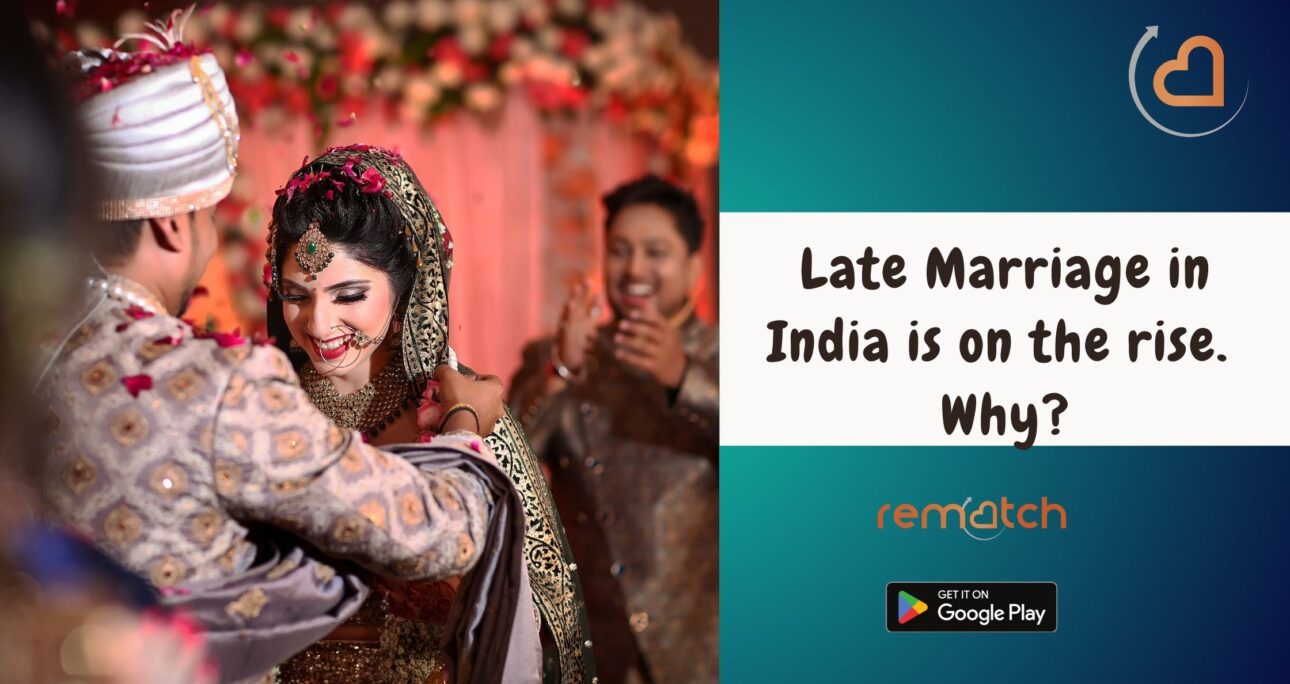Late marriage in India holds a significant milestone in one’s life. Moreover, it is an answer to the societal pressure to get married at a young age. Moreover, in recent times, a noticeable shift in this trend is coming to our attention. Nowadays, many individuals opt to marry later in life. But is late marriage becoming a common trend in India, or is it simply a result of shifting social norms? Let’s explore this topic further.

Changing Social Norms and Late Marriage in India
In India, marriage is not just a union of two individuals, but a merger of two families. Thus, this traditional arranged marriage system is a part of Indian culture. However, over the years, the influence of Western culture and the rise of individualism have made way for a change. Furthermore, the social norms, customs, and partner goals also see a change. Besides this, marriage finds its way to the lowest level on the list of priorities.
Many young Indians are now choosing to focus on their careers and personal goals before tying the knot, leading to a rise in the age of marriage. In urban areas, where opportunities for higher education and employment are more abundant, late marriage has become increasingly common. Additionally, with the increasing participation of women in the workforce and the emphasis on gender equality, the pressure to get married at a young age has reduced significantly.
Statistics on Late Marriage in India
According to a survey conducted by the National Family Health Survey (NFHS), the average age of marriage for women in India has increased from 18.3 years in 2005-06 to 19.3 years in 2015-16. Similarly, the average age of marriage for men has increased from 23.2 years in 2005-06 to 24.5 years in 2015-16.
Another survey conducted by the Registrar General of India shows that the proportion of unmarried individuals in the age group of 20-34 has increased from 63.4% in 2001 to 71.5% in 2011.

Implications of Late Marriage in India
Late marriage has several implications, both positive and negative. On the positive side, it allows individuals to focus on their careers. Next, even they can fulfill their personal goals before getting married. Thus, it also gives them more time to find a compatible partner. Therefore, they can make a well-informed decision together.
However, late marriage also has its downsides. As individuals age, their fertility decreases, making it more difficult for them to conceive and have children. Additionally, late marriage can lead to a decline in the physical and emotional health of individuals. Subsequently, they may have to deal with age-related health issues. Furthermore, they may have to take care of elderly parents.
Positive and negative impact of late marriage on the economic growth of India
Late marriage can have both positive and negative impacts on the economic growth of India. On the positive side, late marriage can lead to higher levels of education and career advancement, particularly for women. This can increase the productivity of the workforce and contribute to economic growth.
Additionally, late marriage can also result in a delay in childbearing. Moreover, it can reduce population growth and put less strain on resources such as healthcare, education, and housing.
However, late marriage can also have negative effects on the economy. Delayed marriages can lead to a decline in the birth rate, which can result in an aging population and a decrease in the workforce. Therefore, it can ultimately lead to a reduction in economic growth.
Furthermore, late marriage can also result in a shift in spending patterns. Individuals who delay marriage may spend more on themselves, such as on travel, education, or personal hobbies, rather than on raising a family. Thus, can lead to changes in consumer behavior.
In conclusion, late marriage may have some positive effects on the economy of India. However, it is important to carefully consider the potential impacts on population growth. Furthermore, the connection between late marriage in India’s workforce dynamics and consumer behavior needs attention.
Conclusion
In conclusion, late marriage is undoubtedly becoming an emerging trend in India. More individuals opt to get married at a later age. Although shifting social norms play a significant role in this trend, it is essential to weigh the pros and cons of late marriage. Ultimately, the decision to get married should be based on individual preferences, priorities, and values.


